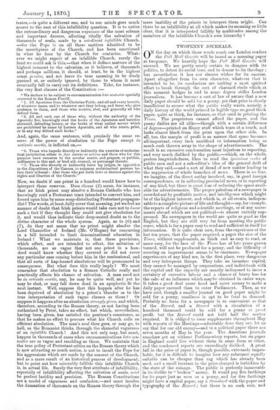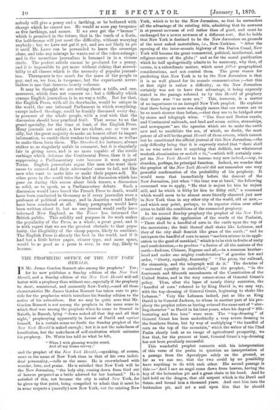TWOPENNY JOURNALS.
ON the day on which these words reach our London readers the Pall Mall Ga:ette will be issued as a morning paper at twopence. We heartily hope the Pall Mall Ga:ette will succeed. We are pretty nearly certain to disagree with its politics, to detest its social tone, and to demur to its theology ; but nevertheless it has our sincere wishes for its success. Apart altogether from its own character, whatever that is intended to be, its conductors are making a most spirited effort to break through the sort of charmed circle which at this moment hedges in and in some degree stifles London journalism. It has become a sort of law of nature that a new daily paper should be sold for a penny, yet that price is clearly insufficient to secure what the public really wants, namely, a daily history of the world printed in legible type on good thick paper, quite as thick, for instance, as that used in printing the Times. The proprietors cannot afford the paper, and the penny dailies are all alike—though with a certain difference of degree—printed on flimsy stuff which tears at a touch, and looks almost black from the print upon the other side. In all, too, the margin of profit is so narrow that space becomes all-important, every inch sacrificed to information being so much cash thrown away in the shape of advertisements. The result is an excessive condensation most injurious to reporting, and very much disliked by the public,—which, on the whole, prefers longwindedness, likes to read the ipsissima verba of public men and not a sub-editor's idea of the general drift of what they said,—and a sort of dread of new matter leading to the suppression of whole branches of news. There is no fear, we imagine, of the direct outlay involved, say, in good foreign correspondence, or in collecting provincial news, or in reporting of any kind, but there is great fear of reducing the space avail- able for advertisements. The proper pabulum of a newspaper is crowded out by profitable matter, and intelligence which might be of the highest interest, and which is, at all events, indispen- sable to a complete picture of life and thought—say, for example, the reports of religious and scientific meetings, or of any move- ments abroad which are not political—is almost entirely sup- pressed. No newspapers in the world are quite so good as the English, but they are still very far from meeting the public crave, which is for a paper easy to read and sufficient in itself for information. It is quite clear now, from the experience of the last ten years, that the paper required, a paper the size of the Times, without supplements, as thick and as easy to read, or more easy, for the face of the Times has of late years grown tanned, will not be produced for a penny, and the difficulty of securing an improvement seems to be enormous. Newspaper experiments of any kind are, in the first place, very dangerous and very infrequent things. They take an immense capital, they cannot be managed by corporations, and individuals with the capital and the capacity are usually indisposed to incur a certainty of excessive labour and a chance of heavy loss for the sake of an influence which may be obtained in easier ways. It takes a good deal more head and more money to make a daily paper succeed than to enter Parliament. Then, as we have said, though a smaller journal on good paper might be sold for a penny, smallness is apt to be fatal to demand. Probably no form for a newspaper is o convenient as that of the Record, and a Record with a circulation of a hundred thousand could be sold for a penny at great profit, but the Record could not hold half the matter required. It is obliged to issue supplements throughout May with reports of the Meetings—admirably done they are, let us say that for our old enemy—and to a political paper there are seven months of May in the year. The American journals somehow get on without Parliamentary reports, but no paper in England could live without them in some form or other, and the condensed reports are exceedingly disliked. A great fall in the price of paper is, though possible, extremely impro- bable, for it is difficult to imagine how any substance equally suitable can be cheaper than rag which has already been used, and a small increase in the price charged is forbidden by the state of the coinage. The public is perfectly immovable in its dislike to " broken " money. It would pay five farthings for its paper just as soon as a penny, and for five farthings might have a capital paper, say a .9andard with the paper and typography of the Record ; but there is no such coin, and
nobody will give a penny and a farthing, or be bothered with change which he cannot use. He would as soon pay twopence as five farthings, and sooner. If we ever get the " bronze " which is promised in the future, that is, the tenth of a florin, the half-bronze will just meet the difficulty, without worrying anybody ; but we have not got it yet, and are not likely to get it until Mr. Lowe can be persuaded to leave the sovereign alone, and take any mintage he wants out of the token coinage ; and in the meantime journalism is hemmed in in a vicious circle. The perfect article cannot be produced for a penny, and it is impossible to get more without risking that accessi- bility to all classes which is the necessity of popular journal- ism. Threepence is too much for the mass of the people to pay, and so, we fear, is twopence, but the experiment never- theless is one that deserves hearty welcome.
It may be thought we are writing about a trifle, and one, moreover, which does not concern us ; but a difficulty which cramps English journalism is in no way a trifle. But for that, the English Press, with all its drawbacks, would be unique in the world, the one informal Parliament in which everything, except indeed theology, could be frankly discussed every day, in presence of the whole people, with a real wish that the discussion should bear practical fruit. That seems to us the grand specialty, for the time at least, of the English Press. Many journals are unfair, a few are violent, one or two are silly, but the great majority do make an honest effort to impart information, to enable their readers to form opinions, as wellas to make them form them. The Standard, for instance, always strikes us as singularly unfair in comment, but it is singularly fair in giving news, and is no more capable of the sterile verbiage which deforms the Continental Press, than it is of suppressing a Parliamentary vote because it went against Tories. English journalists argue like men who want their cause to succeed and their adversaries' cause to fail, not like men who want to make hits or make their papers sell. No other press in the world tries the kind of discussion which has gone on during this recess about Irish tenure, a discussion as solid, so to speak, as a Parliamentary debate. Such a discussion would have bored the French Press to death, would have been conducted in Germany as if every journalist were a professor of political economy, and in America would hardly have been conducted at all. Sharp paragraphs would have been written about it, but no one journal would really have informed Now England, as the Times has informed the British public. This solidity and purpose in its work makes the popularity of the Press, as a whole, a great good, and it is with regret that we see the greatest obstacle to that popu- larity, the illegibility of the cheap papers, likely to continue. The English Press is already the best in the world, and if it bad but a little better paper, clearer type, and more space, would be as good as a press is ever, in our day, likely to become.











































 Previous page
Previous page